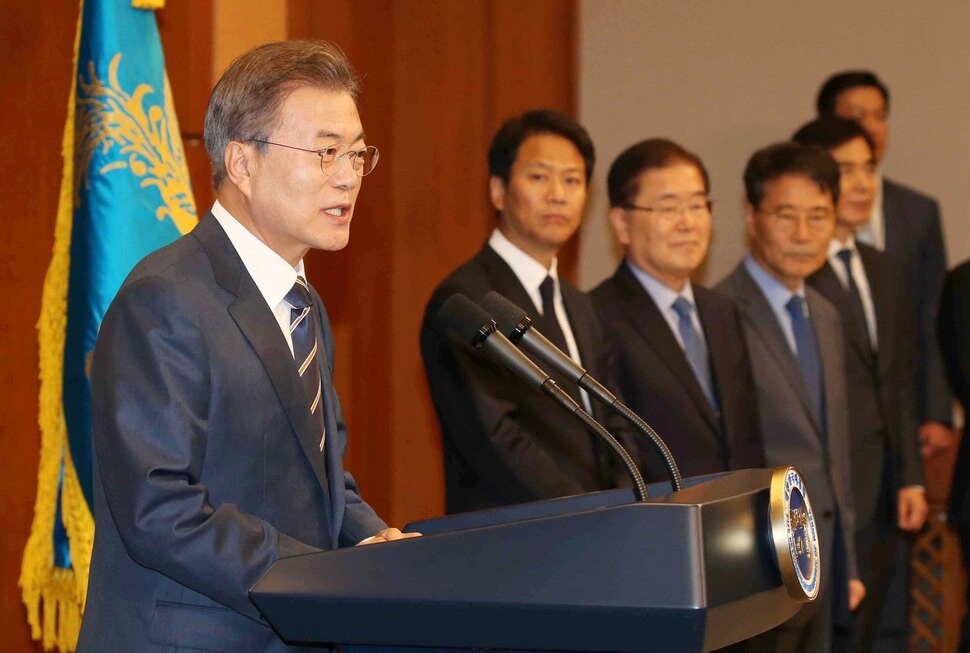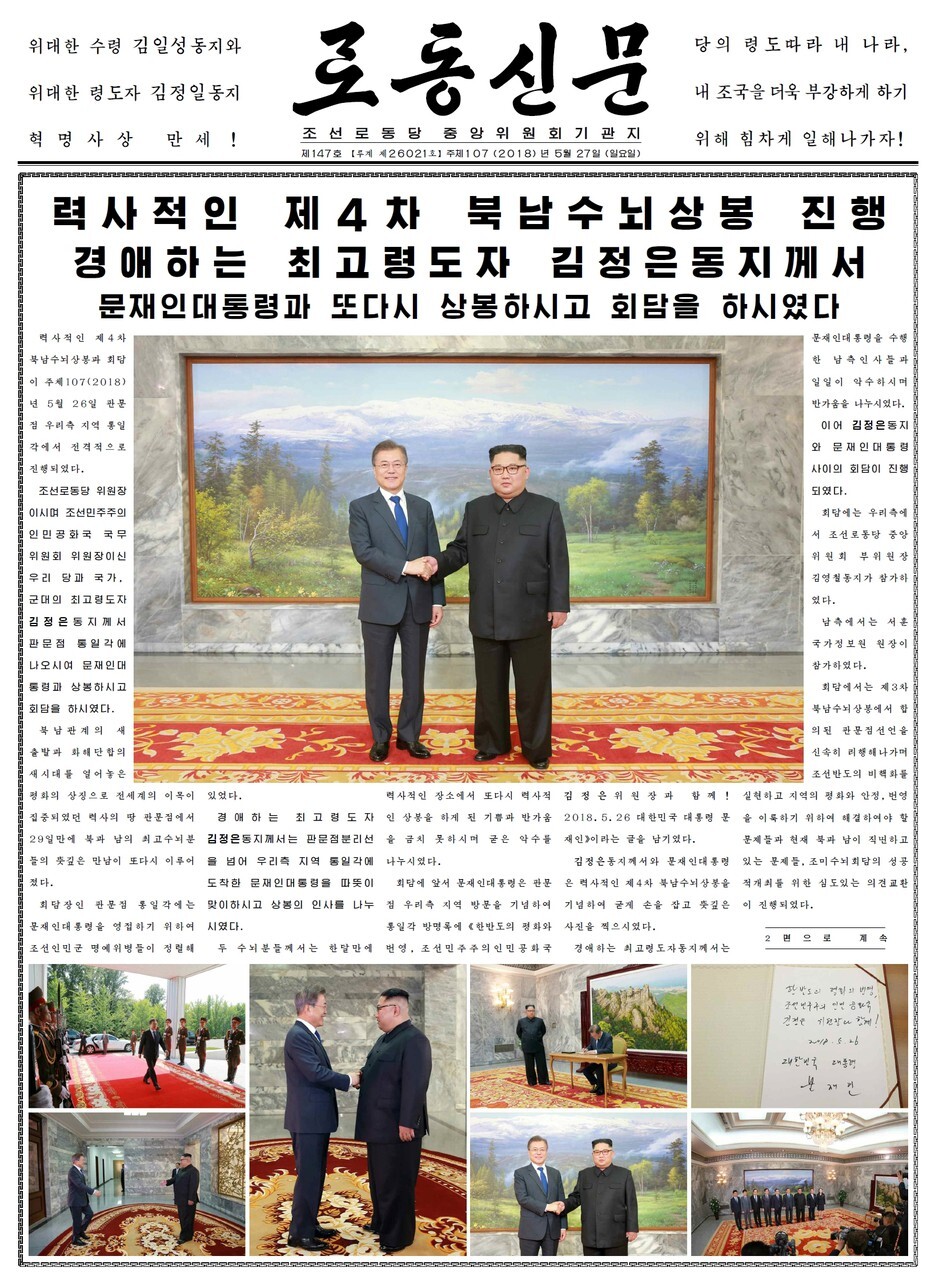hankyoreh
Links to other country sites 다른 나라 사이트 링크
[News analysis] Turning point toward “replacing mistrust with trust” on the Korean Peninsula

If US President Donald Trump had not sent the letter cancelling the North Korea-US summit that was supposed to be held in Singapore on June 12, there would probably not have been an inter-Korean summit in Panmunjeom on May 26, the second in two months.
Thanks to the completely unexpected summit, which came out of the blue, South Korean President Moon Jae-in and North Korean leader Kim Jong-un managed to revive the North Korea-US summit and qualitatively upgrade inter-Korean relations.
It was a classic example of creating good from evil. The surprise move by Moon and Kim to break out of the crisis was a joint declaration that the Korean Peninsula will no longer remain a lonely outpost of the Cold War and that Koreans will no longer be swayed by the political machinations and the wedges driven by the four powers around the Korean Peninsula – the US, China, Japan and Russia – which have caused them to squander so much time in war, division and conflict.
This undergirds the significance of President Moon’s vow that “this will be a completely new beginning that changes the course of history.”
That’s also why several sources who are familiar with developments described this as a “very interesting development” that “no one had expected” and said that it is a “turning point” toward “a process of replacing mistrust with trust” on the Korean Peninsula.
One significant aspect of the May 26 summit was that it put into practice a promise made by the two leaders in their Apr. 27 Panmunjeom Declaration “to hold frequent and candid discussions on issues vital to the nation [. . .] through regular meetings and direct telephone conversations.” This sets a positive precedent for turning words into actions.
“I think it’s very significant that this meeting was organized as normally and routinely as friends might do. That’s how I think South and North Korea ought to meet,” President Moon said on May 27 while announcing the results of the summit.
Kim Jong-un also ascribed meaning to the May 26 summit during his opening remarks, when he said, “This is the process of our hearts drawing closer together, of Pyongyang and Seoul coming closer together.”
North Korea’s state-run Rodong Sinmun proclaimed the summit to be “a historic opportunity for opening a new venue for inter-Korean relations.”

New age in inter-Korean relations
“In the past, a great deal of time and effort was required for the leaders of South and North Korea to sit down together, and the ease with which we made contact and met together is emblematic of a new age in inter-Korean relations,” President Moon said in his closing remarks after the summit.
“If communication between the leaders becomes routine, it will create an opportunity for the stable and routine development of inter-Korean relations. It’s impossible to express how significant this is for inter-Korean relations,” said a former senior official who is familiar with how the first and second inter-Korean summits were arranged.
“Internally speaking, this could be a turning point that will bring us beyond the conflict and division represented by the tired cliché that North Korea ignores the South and only communicates with the US,” the official said.
More than anything else, the May 26 summit signifies the rediscovery of inter-Korean relations, or in other words a relationship reset based on adjusting priorities in inter-Korean relations and North Korea-US relations amid the war and division on the Korean Peninsula. The fact that the North Korea-US summit was rescued from near collapse by a surprise meeting between the leaders of South and North Korea shows that inter-Korean cooperation can propel North Korea-US relations.
This constitutes a convincing argument that the hoary truism in international relations that inter-Korean relations cannot violate the limits set by the US may not be an immutable truth.
“The series of events from Trump’s letter of cancellation to the inter-Korean summit on May 26 has shown South and North Korea that inter-Korean relations need to be a half step, or even a full step, ahead of North Korea-US relations,” said a source who is familiar with the situation.
According to this source, inter-Korean relations can and should serve as a safety valve for “maintaining speed and preventing a reversal” when North Korea-US relations falter for lack of trust.
“Kim Jong-un’s behavior acknowledges how urgently he needs help not only from President Xi Jinping in China [North Korea’s traditional sponsor] but also from President Moon in dealing with the US,” a former senior official said.
Developments in inter-Korean relations will force outside powers to rethink their strategy
“The leaders of North and South Korea expressed their views about continuing to take joint action to bring about the denuclearization of the Korean Peninsula and were in agreement about proactively organizing frequent talks and bringing together their strength and wisdom moving forward,” the Rodong Sinmun said on May 27.
“We confirmed that our journey toward the denuclearization of the Korean Peninsula and a permanent peace regime cannot be halted, and we agreed to work together closely toward that end,” President Moon said.
Though the North Korean nuclear issue (that is, hostile relations between North Korea and the US) has traditionally been reserved for the agenda of North Korea-US talks, President Moon’s remarks constitute a pledge to address this issue through inter-Korean cooperation under the aegis of dismantling the Cold War alignment on the Korean Peninsula. This is a development that will force not only the US, which essentially acts as the hegemon in Northeast Asia, but also the regional powers of China, Japan and Russia, to reconsider their strategy on the Korean Peninsula.
By Lee Je-hun, senior staff writer
Please direct comments or questions to [english@hani.co.kr]

Editorial・opinion
![[Guest essay] Preventing Korean Peninsula from becoming front line of new cold war [Guest essay] Preventing Korean Peninsula from becoming front line of new cold war](https://flexible.img.hani.co.kr/flexible/normal/500/300/imgdb/original/2024/0507/7217150679227807.jpg) [Guest essay] Preventing Korean Peninsula from becoming front line of new cold war
[Guest essay] Preventing Korean Peninsula from becoming front line of new cold war![[Column] The state is back — but is it in business? [Column] The state is back — but is it in business?](https://flexible.img.hani.co.kr/flexible/normal/500/300/imgdb/original/2024/0506/8217149564092725.jpg) [Column] The state is back — but is it in business?
[Column] The state is back — but is it in business?- [Column] Life on our Trisolaris
- [Editorial] Penalties for airing allegations against Korea’s first lady endanger free press
- [Editorial] Yoon must halt procurement of SM-3 interceptor missiles
- [Guest essay] Maybe Korea’s rapid population decline is an opportunity, not a crisis
- [Column] Can Yoon steer diplomacy with Russia, China back on track?
- [Column] Season 2 of special prosecutor probe may be coming to Korea soon
- [Column] Park Geun-hye déjà vu in Yoon Suk-yeol
- [Editorial] New weight of N. Korea’s nuclear threats makes dialogue all the more urgent
Most viewed articles
- 1South Korean ambassador attends Putin’s inauguration as US and others boycott
- 2Family that exposed military cover-up of loved one’s death reflect on Marine’s death
- 3Behind-the-times gender change regulations leave trans Koreans in the lurch
- 4Yoon’s broken-compass diplomacy is steering Korea into serving US, Japanese interests
- 5Yoon’s revival of civil affairs senior secretary criticized as shield against judicial scrutiny
- 6[Guest essay] Preventing Korean Peninsula from becoming front line of new cold war
- 7Japan says its directives were aimed at increasing Line’s security, not pushing Naver buyout
- 8Marines who survived flood that killed colleague urge president to OK special counsel probe
- 9‘Weddingflation’ breaks the bank for Korean couples-to-be
- 10Amid US-China clash, Korea must remember its failures in the 19th century, advises scholar